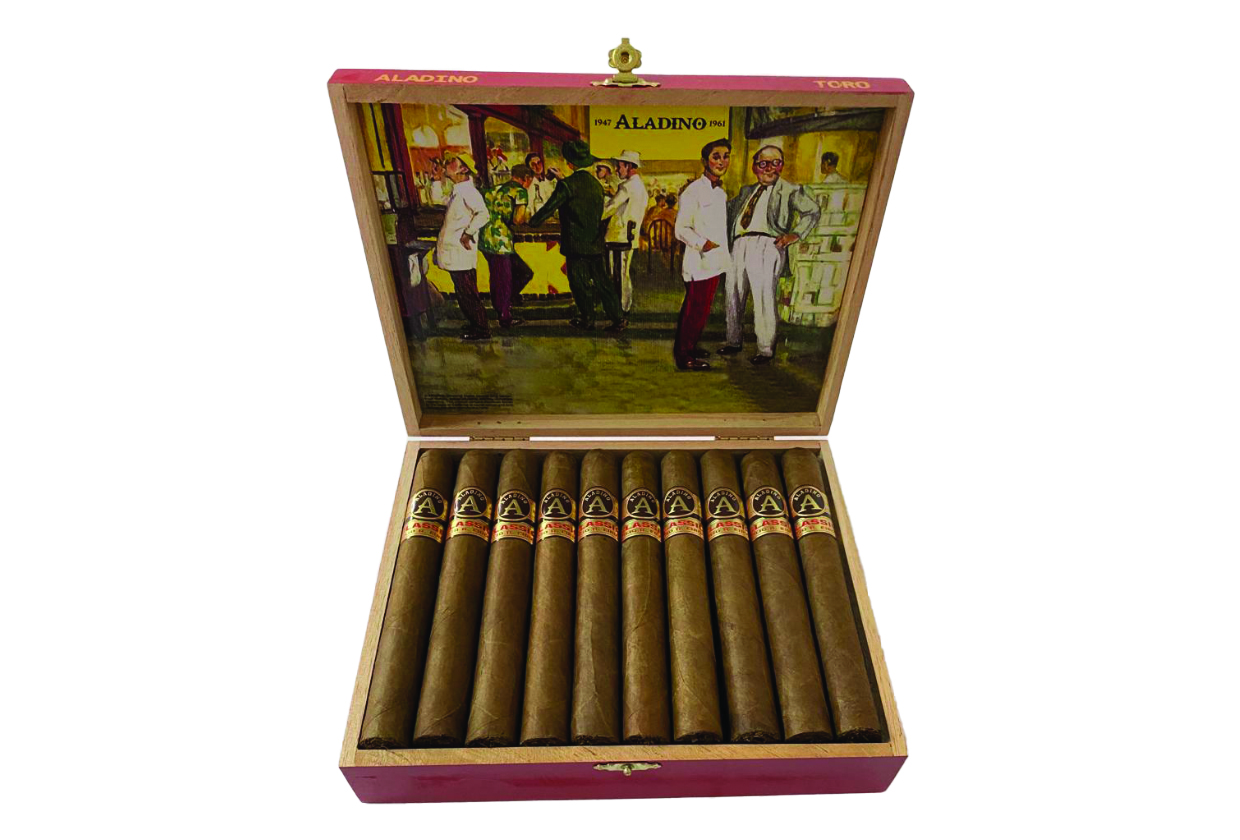In May, JRE Tobacco Co. announced a new regular production line under its Aladino brand named Aladino Classic made with tobacco grown by the company on farms in the Jamastran Valley located in southern Honduras. The four-vitola line joins six other brands under the Aladino umbrella, a list that includes Aladino Cameroon, Aladino Connecticut, Aladino Corojo, Aladino Corojo Reserva, Aladino Habano Vintage Selection and Aladino Maduro.
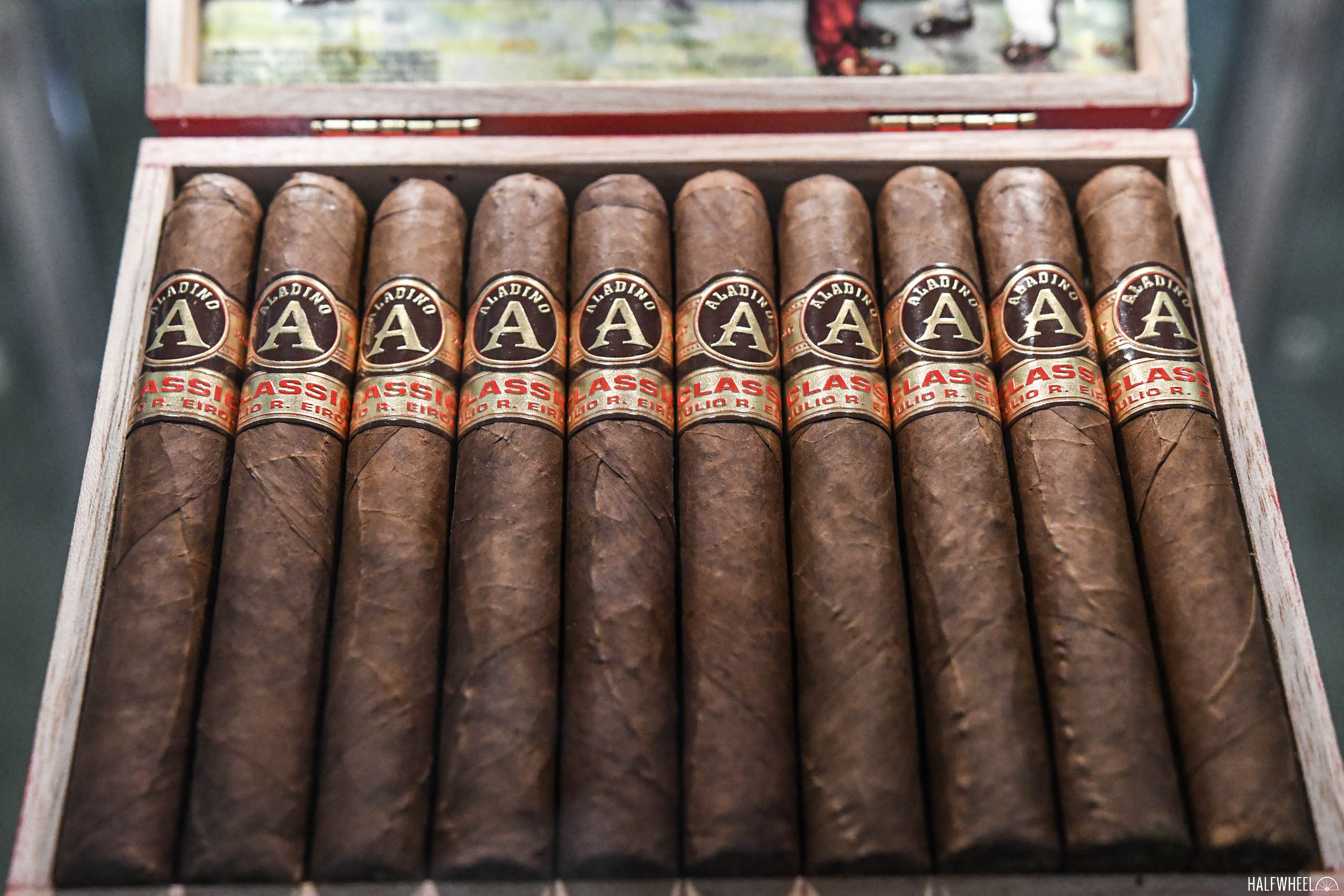
According to Vivi Eiroa, the company wanted to create a line with a profile that was not as corojo-forward as most of JRE’s blends—or as they described it to Brian Burt during the PCA Trade Show, to create a more classic cigar profile—making the name Aladino Classic moniker a no brainer.
Blend-wise, the Aladino Classic is made with all Honduran tobacco that has been grown by the company, including a habano seed wrapper covering a corojo-seed binder and a filler that uses both habano and corojo leaves. It is made at Fábrica de Puros Aladino at Las Lomas Jamastran in Honduras.
The first batch of cigars began shipping in June exclusively to a small group of retailers who have visited JRE’s farms and facilities in the past—Justo Eiroa told halfwheel that it was “a very limited amount of all four sizes”—but other retailers were able to order the cigars during the 2022 PCA Convention & Trade Show that took place in July.
Note: The following shows the various Aladino Classic releases over the years. Please note, some of these cigars may have been released after this review was originally published. The list was last updated on Aug. 12, 2022.

- Aladino Classic Corona Classic (5 x 44) — $7 (Box of 20, $140)
- Aladino Classic Robusto (5 x 50) — $8.60 (Box of 20, $172)
- Aladino Classic Toro (6 x 50) — $9.60 (Box of 20, $192)
- Aladino Classic Gordo (6 1/2 x 60) — $10.60 (Box of 20, $212)
89
Overall Score
Along with CLE’s Eiroa brand—made by Julio's son, Christian, who runs his own company—Aladino has been a huge influence in changing my mind about just how good Honduran tobacco can be. While the Classic Robusto is not as complex or rich as the Aladino Cameroon blend—or the Eiroa The First 20 Years, for that matter—it is no slouch in the flavor department, with an assortment that includes creamy cashews, dried tea leaves, cocoa nibs and molasses sweetness, as well as some mint and grilled asparagus, albeit in two different cigars. In addition, there were very few construction issues overall and the solidly medium strength is well-balanced with the rest of the profile. The Aladino Classic Robusto was not only an easy blend to enjoy but is also an easy blend to recommend, especially if you are already a fan of what the company has released in the past.
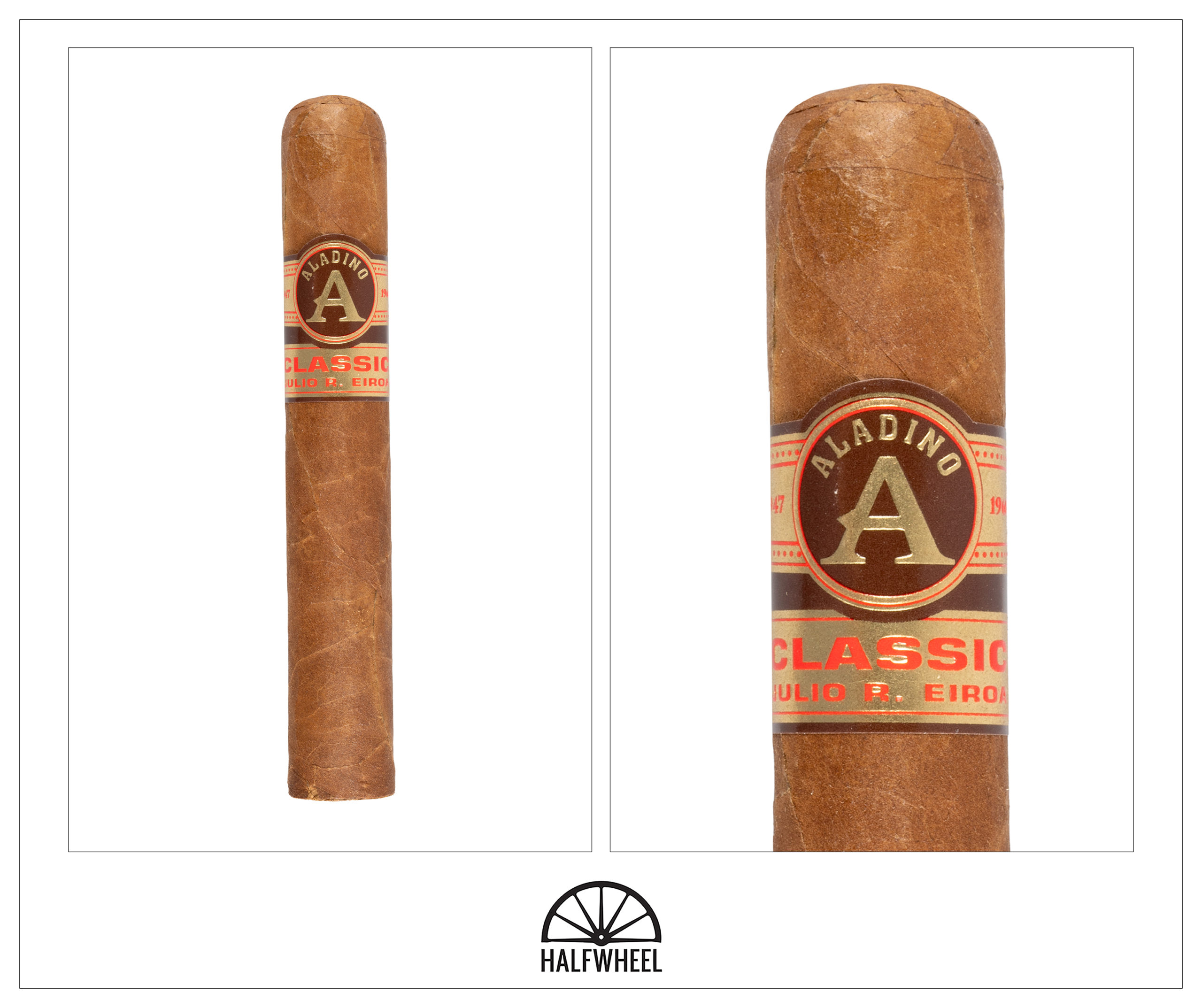
- Cigar Reviewed: Aladino Classic Robusto
- Country of Origin: Honduras
- Factory: Fábrica de Puros Aladino at Las Lomas Jamastran
- Wrapper: Honduras (Habano)
- Binder: Honduras (Corojo)
- Filler: Honduras (Corojo & Habano)
- Length: 5 Inches
- Ring Gauge: 50
- Vitola: Robusto
- MSRP: $8.60 (Box of 20, $172)
- Release Date: July 2022
- Number of Cigars Released: Regular Production
- Number of Cigars Smoked For Review: 3
The three Aladino Classic Robustos I am smoking for this review are remarkably similar from a visual standpoint: each is covered in a red-tinted cinnamon brown wrapper with very little oil on it. The wrapper is parchment rough to the touch and feels extremely dry. Aroma from these wrappers is relatively faint and includes notes of leather, earth, manure, dark chocolate and indeterminate sweetness. The foot fares a bit better when it comes to aromas, as I smell not only stronger aromas of generic nuts, leather, barnyard, hay and nutmeg, but also some nice sweetness that reminds me of vanilla beans. After a straight cut, the cold draws include strong flavors of cashews, mineral salt, leather, hay, earth and sourdough bread along with a very small amount of vanilla beans sweetness and some light white pepper.
After the foot is toasted, the first few puffs of the Aladino Classic Robusto are both sweet and spicy at once, with molasses, espresso beans and white pepper flavors combining with some spice on my tongue. Those are superseded fairly quickly by the main flavors of creamy cashews and cocoa nibs, while additional notes of the same espresso beans, graham crackers, leather tack, earth and a slight cinnamon flavor bring up the rear of the profile. The profile also includes quite a bit of both white pepper and molasses sweetness on the retrohale, neither one of which seems to be receding anytime soon. Interestingly, the first cigar I smoke features a grilled asparagus flavor on the finish, but it came and went randomly and was never present for more than two puffs at a time before disappearing again. Flavor ends the first third at a solid medium while the body and strength are hand in hand at a point just under medium. Construction-wise, none of the cigars show even the slightest hint of trouble when it comes to the draw, burn or smoke production.
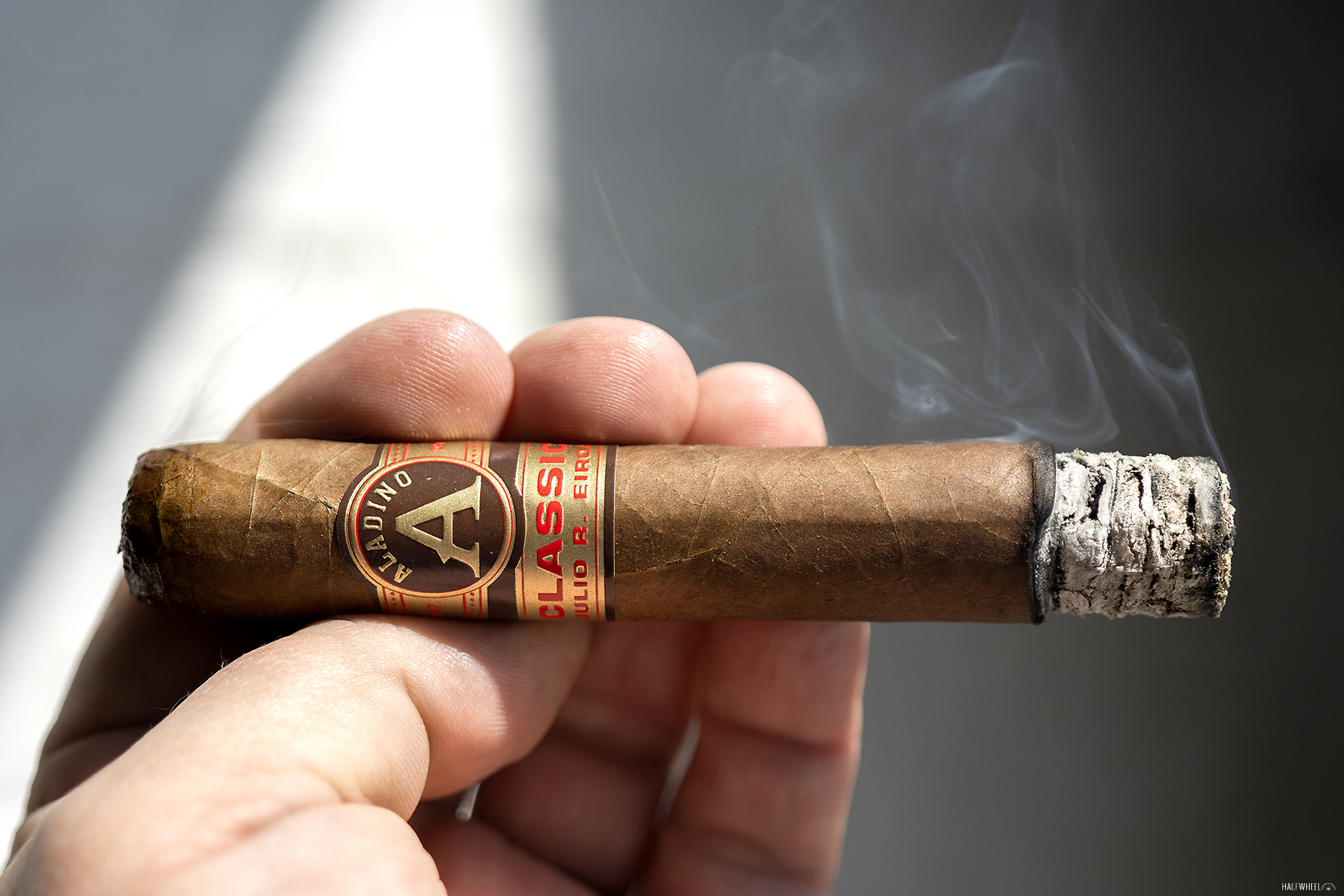
Although the spice that was present on my tongue during the majority of the first third is long gone by the time the second third of the Classic Robusto begins, the same cannot be said of the top flavors of cocoa nibs and cashews, both of which show no signs of receding. Secondary flavors include creamy cedar, peanut butter, earth, cinnamon, mineral salt, leather and sourdough bread, while one of the cigars features a unique flavor note on the finish for a very short time, specifically a mint leaf note. The retrohale has not changed in any noticeable way, which means that both the white pepper and molasses sweetness are staying put for the time being. Flavor bumps up to a point just slightly above medium while the body increases enough to reach a solid medium, but the strength stays put just below the medium mark as the second third comes to an end. In terms of construction, the smoke production and draw continue to impress on all three cigars, but two of the Aladinos run into some minor burn issues that need correcting to keep things on track.
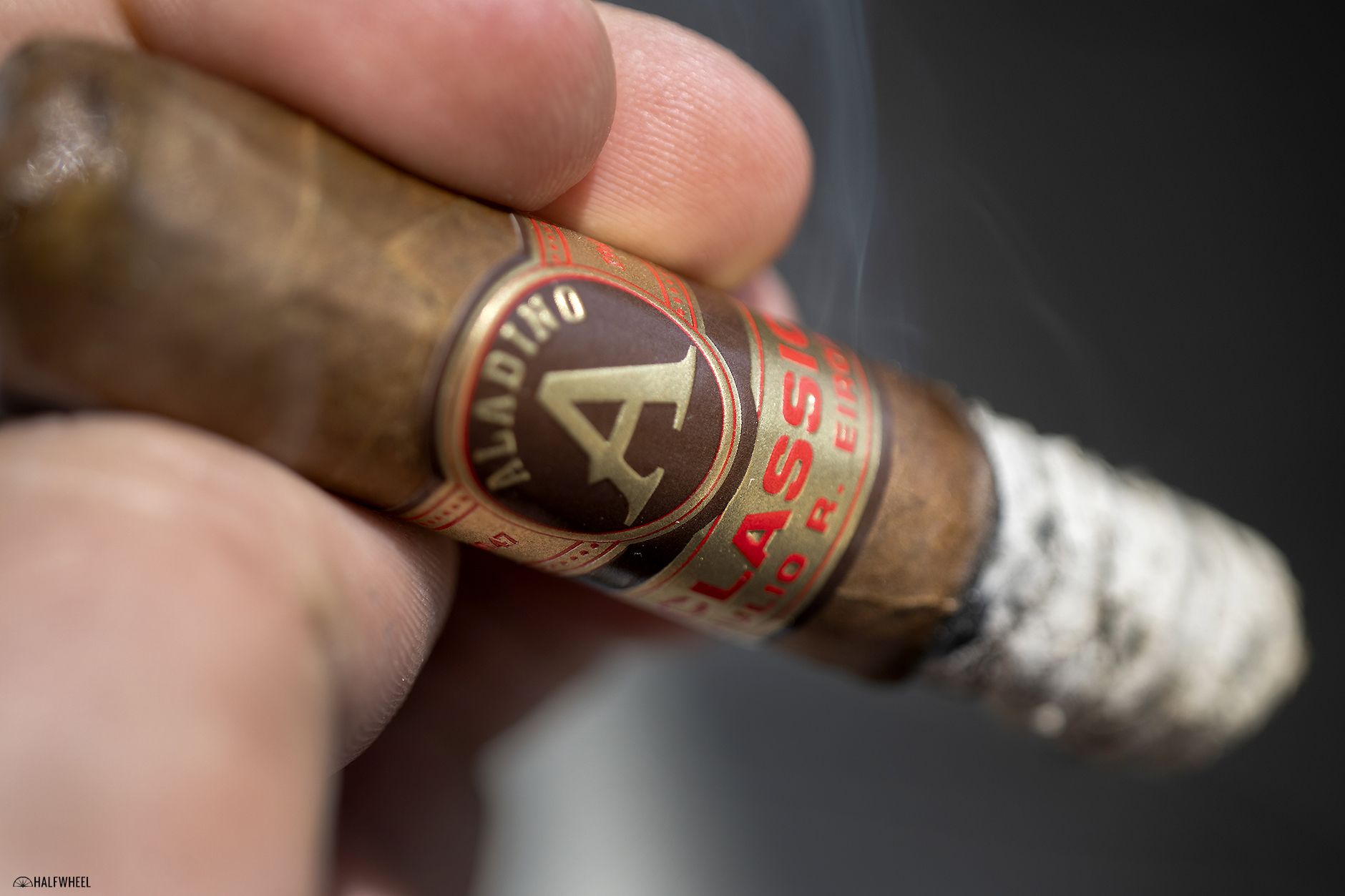
There is a change in at least one aspect of the profile of the Aladino during the final third, a new dried tea leaf flavor combines with the cashew note that is still very much present to become the main flavors in the profile while the cocoa nibs note fades enough to become a secondary flavor. That combination is interspersed with other flavors of sourdough bread, cocoa nibs, espresso beans, graham crackers, leather, earth and cinnamon, while the white pepper and molasses sweetness remain quite obvious on the retrohale, albeit noticeably reduced compared to the first and second thirds. Flavor and body both end the cigar where they began—just over the medium mark—while the strength level crosses into a solid medium just before I put the nub down. Finally, the construction remains on track for the most part, as all three cigars continue to feature excellent draws and plenty of smoke production, while only one cigar needs a quick correction with my lighter.

Final Notes
- Interestingly, two of the three cigars I smoked for this review had a unique flavor on the finish at some point: grilled asparagus on the first cigar and mint leaves on the second cigar. To be clear, neither of these were ever major flavor notes in the profile—or even close to it—but both showed up at least twice and were distinct enough for me to recognize.
- The habano wrapper used on these cigars is both super thin and extremely fragile. While it never unraveled or caused any issues for me, it is something to be aware of nonetheless.
- In June, Vandermarliere Family of Cigars—the owner of J. Cortès and Oliva Cigar Co.—announced the return of the Cuba Aliados brand that will be relaunched with two distinct lines, one of which is a regular production being made by Julio Eiroa of JRE Tobacco Co.
- Charlie visited the JRE Tobacco operation in Danlí, Honduras in 2018, as you can see here.
- Construction was excellent in just about every way, with amazing draws, plenty of smoke production and only three minor corrections needed between the three cigars.
- The cigars smoked for this review were purchased by halfwheel.
- Final smoking time for all three cigars averaged one hour and 27 minutes.
- If you would like to purchase any of the Aladino Classic Robustos, site sponsor Atlantic Cigar Co. has them listed on its website here.
89
Overall Score
Along with CLE’s Eiroa brand—made by Julio's son, Christian, who runs his own company—Aladino has been a huge influence in changing my mind about just how good Honduran tobacco can be. While the Classic Robusto is not as complex or rich as the Aladino Cameroon blend—or the Eiroa The First 20 Years, for that matter—it is no slouch in the flavor department, with an assortment that includes creamy cashews, dried tea leaves, cocoa nibs and molasses sweetness, as well as some mint and grilled asparagus, albeit in two different cigars. In addition, there were very few construction issues overall and the solidly medium strength is well-balanced with the rest of the profile. The Aladino Classic Robusto was not only an easy blend to enjoy but is also an easy blend to recommend, especially if you are already a fan of what the company has released in the past.
I have been smoking cigars for over eight years. A documentary wedding photographer by trade, I spent seven years as a photojournalist for the Dallas Morning News and the Fort Worth Star Telegram. I started the cigar blog SmokingStogie in 2008 after realizing that there was a need for a cigar blog with better photographs and more in-depth information about each release. SmokingStogie quickly became one of the more influential cigar blogs on the internet, known for reviewing preproduction, prerelease, rare, extremely hard-to-find and expensive cigars. I am a co-founder of halfwheel and now serve as an editor for halfwheel.








